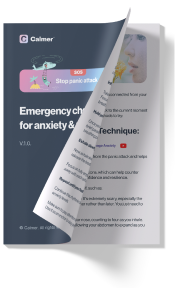Key Takeaways:
- A guilt complex is something you have when you feel excessive guilt, even when you’ve done nothing wrong.
- There are many causes of guilt, including past trauma, being a parent, mental health conditions, and low self-esteem.
- You can work on feeling less guilty through things like therapy or reaching out to a friend or family member.
Guilt is a common feeling that many of us know too well, but a little bit of it can actually be good. If you’ve done something wrong, it gives you a little kick, making you think, ‘Maybe I should apologize?’ and allowing personal growth and change. However, some people continue to experience guilt, even after they’ve made amends or even if they’ve done absolutely nothing wrong!

Do you experience debilitating amounts of guilt every day, even when you haven’t left the house? Do you always think you’ve done something wrong, making it hard to focus on anything else? If this is the case, you might have a guilt complex.
Here’s all you need to know about it.
What is a guilt complex?
Guilt complexes are experienced by people who have an ongoing belief that they have done something wrong. This means they have strong feelings of chronic guilt, anxiety, and sometimes shame, even when it isn’t warranted at all. Even if those around them assure them they have nothing to feel guilty about, the feelings will persist, making it hard for them to go on in their daily lives normally.
Those with a guilt complex have also been found to often suffer from other mental health issues such as depression, OCD, and PTSD.
Types of guilt
Guilt isn’t just a singular feeling that everyone feels in the same way. You might feel different levels of guilt about different things compared to others suffering from a complex.
Here are the main types of guilt:
- Interpersonal guilt – Guilty feelings about making loved ones feel bad or causing them some sort of pain.
- Survivor guilt – Constant feelings of guilt over still being alive/okay when others lost their lives or were severely injured.
- Parental guilt – Intrusive thoughts by a caregiver telling them that they aren’t doing a good enough job at being a parent.
- Excessive guilt – A form of prolonged guilt that appears regularly, harming a person’s daily life.
- Existential guilt – Guilty thoughts telling a person that they aren’t living up to their full potential or aren’t getting anywhere in life.
- Anticipatory guilt – A type of retrospective guilt that occurs when someone evaluates their past actions or past mistakes and starts to feel bad over it.
What causes a guilt complex?
There’s no universal cause of guilt for people around the world. Several different causes can cause both appropriate guilt and excessive guilt. These can include the following:
- Traumatic events
- Past experiences
- Unfulfilling goals
- Hurting other people’s feelings
- Suppressing past guilt
- Low self-esteem
- Having high standards
- Being a parent
- Things out of your control
- Mental health conditions
How to start feeling less guilty
A guilt complex can negatively impact one’s life, so looking for ways to feel less guilty is the first step to feeling yourself again.
Consider therapy
Professional help can do more for your guilt than you might imagine. A mental health professional, whether trained in cognitive behavioral therapy or acceptance and commitment therapy, has the best tools to help you let go of your guilt.
Talk to friends and family
Having a friend or family member to just talk to is good for all mental health conditions. They might not be able to cure your guilt complex, but they give you someone to lean on, offer support, and give you some perspective.
Forgive yourself
This is not easy, but it works. One of the best ways to get rid of guilt is to start learning the skill of self-forgiveness. Sometimes, it does not necessarily mean thinking you’re innocent when you are at fault, but it allows you to be mature enough to take responsibility for the situation.
Reframe the situation
Instead of always focusing on the negatives of every situation in your life, why not look at it differently? Was it really as bad as it seemed? Would you blame someone if they made the same mistake? What can you do differently in the future? This can shift your negative thoughts into more positive ones.
Final thoughts
If you’ve been feeling guilty every day for a long time for no apparent reason, you most likely have a guilt complex. We understand how distressing it can be, so we’ve provided you with some tips to help. You might also want to consider using the Calmer – Anxiety & Panic Attack Relief App for feelings of anxiety associated with your guilt, as it offers a wide range of tools, exercises, and resources.




